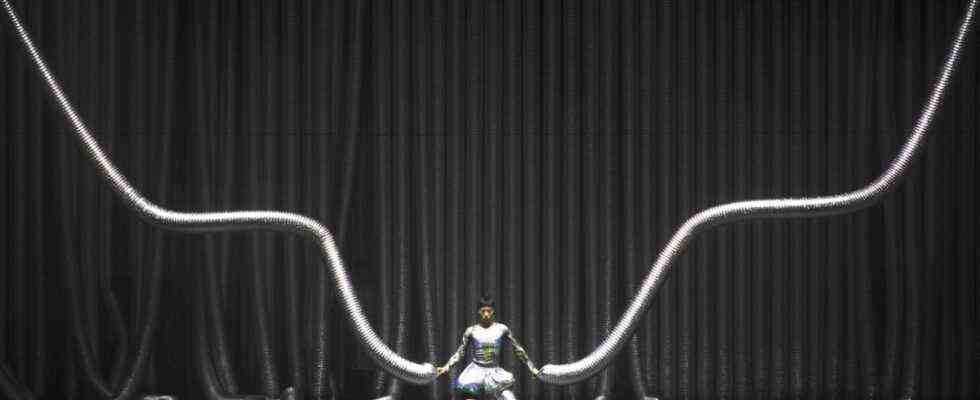The mother is a fine woman, very feminine, in the West one would say: ladylike. She loves pretty clothes, long hair, and has a certain clinking eye. The less she can understand why the daughter wears a raspy hairstyle. The father, on the other hand, does not understand what the adolescent is up to. He only sees something with movement, costume, strange gestures. “Pssst”, says the girl, “you don’t have to get that, just sit down and watch.”
Eun-Me Ahn’s parents had no idea about art and little sense of female emancipation. All the more astonishing that they let the freedom-hungry daughter have her way. Decades later she returned the favor: In 2011 the choreographer brought her mother on stage and cast her as one of the ten “Dancing Grandmothers” with whom she went on tour. The old lady not only broke out of the housewife existence, she blossomed, charmed the audience and proved to be an eminently gifted performer. “A natural talent, because she has never had dance lessons,” says Eun-Me Ahn with a laugh and sways gracefully on the bench of a Potsdam hotel.
The conversation with the 59-year-old resembles a cheerful performance from the very first minute: head between hands, elbows on the table, body bend and unfold, the whole thing is accompanied by purrs, hisses and growls – every word, every sentence becomes mimic and gestural orchestrated. This woman, that much is clear, is not just a dancer, she is equipped with a mission: people should immerse themselves in their stage fantasies, in the sentimental and dazzling revues that she has been designing for more than twenty years. “Dance,” says Eun-Me Ahn, jumping up and down like a rubber ball, “Dance is a universal language that nobody has to learn – it is enough to just jump into it.”
That is of course a gross understatement, at least when it comes to the young professional dancers who will be guest at the Potsdamer Tanztage with the German premiere of Eun-Me Ahn’s “Dragons”. Both the seven performers present in person and the holograms of another six dancers are bursting with energy. Again and again they hit the ground, do somersaults and sweep like dervishes across the stage, the movable walls of which are made of shiny silver flexible pipes.
The dragons of the title have an all-round positive image
Visual effects alienate the setting in heaven, hell or a water basin, fountains, whirlpools or lush vegetation pop up thanks to the projection on the stage portal, the costumes glitter like Christmas balls. With one exception, the dancers were all born after 2000, i.e. children of the 21st century – and cast in such a way that it becomes clear: This generation empowers itself, claims space and will defend its interests. She is fearless and fiery and emulates the dragon that gave the title its title, which was given an all-round positive image here – which the audience in the Hans Otto Theater in Potsdam celebrated with great enthusiasm.
The piece, which will also stop in St. Pölten, Hamburg and Ludwigshafen in spring 2022, was largely developed by Eun-Me Ahn during the pandemic, via Zoom. She benefited from the fact that the young dancers are all at home on the Internet, while she herself had to get used to the adventure of contactless rehearsals. In Seoul, there were no theater lockdowns during the pandemic, but the collateral damage in everyday life is enormous there too: “Small shops close in rows, only those who sell online can survive.” It hurts her, because the country she was born in, which she by no means always loved, has grown dear to her – at least for half of the year that she is not on tour.
“Dance is a universal language” – the Korean Eun-Me Ahn is one of the most important Asian choreographers.
(Photo: Oh Min Soo)
As a young woman, Eun-Me Ahn only wanted one thing: “Get out of Korea! It was a prison, everything narrow and repressive – we only whispered names of choreographers like Cunningham or Alvin Ailey behind closed doors.” So she used the first opportunity she had to move to New York and study there with the luminaries of contemporary dance. She developed a language of movement that fused Korean tradition and American coolness. A delicious mixture that she gives the audience with performers of all kinds: Grandmothers, people with disabilities and teenagers have already been infected by Eun-Me Ahn’s love of dancing and toured Europe’s stages with their productions. When Eun-Me Ahn was asked to run a contemporary company, she moved back to Korea: “Studios, dancers, performance opportunities – and all of this is paid for? That just sounded heavenly to me.”
She had a close friendship with Pina Bausch, the late doyenne of the Wuppertal dance theater: “We had an incredible amount to talk about, and” – Eun-Me Ahn leans far over the table – “Pina always spoke so softly that I spoke to her had to come very close. While I have a rather loud organ. ” In fact, you can hear the little woman long before she comes into sight. And at some point in the course of the conversation, wonders why the Wuppertal dance theater did not order a collaboration with the cheerful Eun-Me Ahn after Bausch’s death. That might have shortened the mourning period significantly.
Across from Eun-Me Ahns Hotel there is a booming fairground, but she doesn’t even think about complaining about it. “Right across the street, the people are having fun – the ideal atmosphere for me.” This woman is a one-woman show, but without any pretense. And, depending on the point of view, a real gift – or a maximum challenge – for cerebral Central Europeans.

